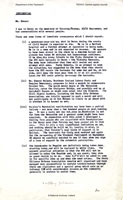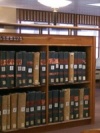 |
NAI Records on CAIN
Background Information
Introduction
Since first being made available on-line in 1997 CAIN (Conflict Archive on the INternet) has sought to provide information and source material on the ‘troubles’ and politics in Northern Ireland from 1968 to the present day. Over the last decade CAIN has proven itself to be an accessible and widely-used resource for scholars and others working in the area of conflict resolution, peace-studies, historical, cultural and Irish studies as well as researchers engaged with issues arising in post-conflict societies. The site has an international appeal and the majority of CAIN users are based outside the UK and Ireland.
Associated Site
From the outset CAIN has sought to encourage contributions to the site and as a consequence the vast majority of the material it holds has been produced by people who do not work directly on the site. Thus CAIN has encouraged and worked with individuals, groups or organizations with relevant information in order to make digital versions of their materials available to a wider audience on-line. An obvious example of this are those contributors with significant collections of material on CAIN who have been given ‘Associated Site’ status.
PRONI Records on CAIN
In 2009 CAIN and the Public Record Office of Northern Ireland (PRONI) agreed to work together on a small-scale pilot project aimed at making a limited selection of material made available under PRONI’s ‘Annual Release’ scheme available on-line. By way of this scheme PRONI selects and brings forward for release to the general public, departmental records relating to Northern Ireland as they approach 30 years of age.
These records, charting as they do developments in the governance of Northern Ireland from the early 1920s to the present day, are a valuable source of information for researchers. Of particular interest to CAIN were those items covered under the ‘Annual Release’ scheme which related to the ‘Troubles’ and politics of Northern Ireland post-1968. An agreement was reached between CAIN and PRONI to allow for a limited selection of this material on CAIN. PRONI was therefore offered and accepted ‘Associated Site’ status on CAIN where this collection would be located.
 National Archives, Ireland Records on CAIN
National Archives, Ireland Records on CAIN
The collaboration between CAIN and PRONI attracted the interest of the National Archives, Ireland. Since its establishment on 1 June 1988 the National Archives, Ireland has become the official holder of the records of the modern Irish state. By way of the National Archives Act 1986 all records of Government Departments, including the courts and a range of other bodies, must be preserved and transferred to the National Archives, Ireland. It then makes these documents available for members of the public to browse and consult. Thus each year a selection of these records relating to Irish government policy on Northern Ireland are released and attract considerable attention. In the summer of 2011 CAIN and the National Archives, Ireland agreed to work on a small-scale project which aimed to make a limited selection of this material available, covering the years from 1965 to 1969.
For both parties there were obvious attractions in this initiative. From CAIN’s perspective the opportunity to add to, and supplement, its existing resources relating to the ‘Troubles’ and the politics of Northern Ireland was obvious. In addition it would also fit into its aim of working with others to ensure material is accessible to as wide an audience as possible.
As for the National Archives, Ireland the proposal also had a number of advantages:
- Firstly, given CAIN’s standing and reputation, this would be an opportunity to promote an important source of material held by the National Archives, Ireland which was not currently being fully utilized; and
- Secondly the National Archives, Ireland is committed to working in partnership with other interested organisations to widen access to the material it holds.
Subsequently National Archive, Ireland was offered and accepted ‘Associated Site’ status on CAIN where the collection of material would be located.
 Funding in December 2102 from the Reconciliation & Anti-Sectarianism Funds, Department of Foreign Affairs and Trade (DFA), allowed for a second selection of 750 records (1970-74) from the National Archives, Ireland to be added to the CAIN site on 28 November 2013. Funding in December 2102 from the Reconciliation & Anti-Sectarianism Funds, Department of Foreign Affairs and Trade (DFA), allowed for a second selection of 750 records (1970-74) from the National Archives, Ireland to be added to the CAIN site on 28 November 2013.
Further DFA funding in July 2014 allowed a third batch of 926 records (1975-80) to be added on 29 June 2017; see press release.
Funding from the Reconciliation Fund, DFA in December 2015 was used to process a fourth batch of 930 records (mainly 1981-85); these were added on 1 February 2018.
Funding from the Reconciliation Fund, DFA in September 2019 was used to process a fifth batch of 965 records (mainly 1986-88); these were added on 29 July 2020.
Funding from the Reconciliation Fund, DFA in November 2021 was used to process a sixth batch of 1,073 records (mainly 1995-98); these were added on 23 May 2023.
Funding from the Reconciliation Fund, DFA in June 2023 was used to process a seventh batch of 842 records (mainly 1992-94); these were added on 11 November 2024.
Funding from the Reconciliation Fund, DFA in June 2024 was used to process an eighth batch of 643 records (mainly 1989-91), these were added on 24 September 2025.
Selection and Preparation of Material
As this was to be a small-scale pilot project between CAIN and the National Archives, Ireland it was decided to concentrate initially on a specific period of time – 1965 to 1969. During these years for the Irish government, events and developments in Northern Ireland took on greater importance. Thus the material selected charts events from the meeting in January 1965 between Sean Lemass, then Taoiseach (Irish Prime Minister) and Captain Terence O’Neill, then Prime Minister of Northern Ireland, to the aftermath of the growing unrest on the streets of Belfast and Derry in the summer of 1969.
 Identification of Material Identification of Material
In any given year the National Archives, Ireland releases a large quantity of material relating to the Northern Ireland ‘Troubles’. Given the limited amount of resources CAIN and the National Archives, Ireland could devote to this project, it was never the intention to look at every file or to scan every item. Instead the focus was on identifying items which could provide users of CAIN with a further insight into some of the key developments in Northern Ireland after 1965. Thus a couple of sources were used to assist in this process. To begin with, reference was made to some of the most important sections on CAIN itself – such as Key Events, Key Issues and the CAIN Chronology.
Secondly, the annual release of Irish government files each year attracts the attention of the media for a few days, most notably in newspapers such as The Irish Times, Irish Independent as well as RTE. Although many of these reports fail to directly indicate the file they come from they still provide a good reference point in terms of what may be of interest.
Finally, to assist the general public in searching the annual releases for any given year the National Archives, Ireland has a selection of searchable resources to help find references to records of interest. The majority of the searchable databases relate to the records of government departments and in the case of this project those of most interest were the Department of the Taoiseach and the Department of Foreign Affairs and Trade. These were used to identify documents as was the advice of members of staff at the National Archives, Ireland. In particular the guidance and expertise of Mr Micheál Ó Conaire (Archivist) and Mr Tom Quinlan (Keeper) was invaluable.
Schedule of Work
In terms of the workload involved with the project, an agreement was reached between CAIN and the National Archives, Ireland. A member of the CAIN team, Dr Brendan Lynn, spent from 12-15 September 2011 working at the National Archives, Ireland to identify items to be scanned.
Scanning
The scanning of the original documents was carried out by an experienced member of the National Archives, Ireland staff, Mr Eamonn Mullaly. It was agreed that the cost of scanning all the material would be reserved by the National Archives, Ireland. CAIN would therefore like to acknowledge and thank the National Archives, Ireland for this particular contribution.
Preparation of Documents
Staff from the National Archives, Ireland were responsible for the initial stage of preparing all the individual documents to be put on-line. This process began by working through the items which had been scanned in TIIF colour format (at 450dpi) and saved to CD-ROMs. The next step in the process was carried out by Mr Micheál Ó Conaire (archivist) who added to each document a standard cover page used by the National Archives, Ireland. In addition on each page a header and footer was added. For instance the header gave information as to the Department which produced the document as well as its catalogue number – Department of the Taoiseach and TSCH/8: Papers of Jack Lynch. As for the footer on each page it contained a National Archives, Ireland copyright symbol - © National Archives, Ireland.
Finally, a member of staff from CAIN, Dr Brendan Lynn, made sure that all the PDF documents were converted using OCR text recognition and then the file size of each individual document was reduced to make them compatible with Adobe Acrobat 5.0 and later versions.
All the items copied from the National Archives, Ireland files were then added to the existing CAIN Bibliography and tagged in such a was as to identify their origin. In addition key words were also added to individual items to help people to identify and search for material they were interested in.
|